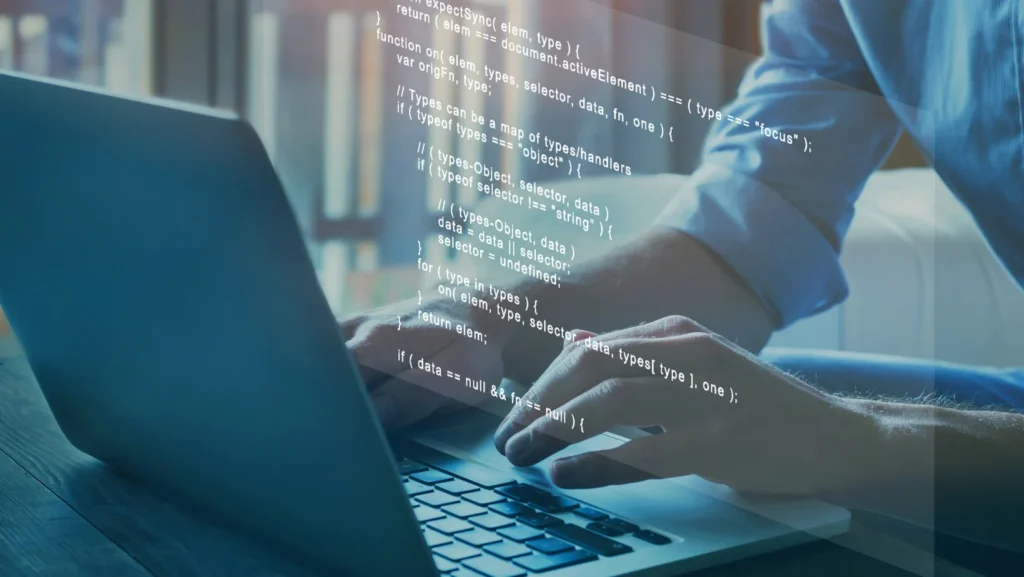Hey there, digital adventurer! Ever wondered about the wizardry behind your favorite apps, websites, and tech marvels? Well, you’re in for a treat as we dive into this guide of “What is Coding and Programming?” – the not-so-secret sauce that brings our digital dreams to life! Imagine it as a superpower, a language that lets you tell computers what to do.
Don’t worry if you’re not a tech whiz; we’re here to unravel the mysteries and turn coding into a friendly journey where everyone is invited to the party. So, grab a virtual seat, and let’s explore this delightful exploration together!
Are you curious about the enchanting world behind your favorite apps and websites?
Ever dreamt of speaking the language of computers, turning your ideas into interactive wonders? Well, coding is your ticket to that exciting journey. Whether you’re a tech novice or someone curious about the digital dance, this guide is your friendly companion into the magical realm of coding.
Imagine the thrill of creating your digital masterpiece, and understanding the language that powers the tech wonders we love. “A Beginner’s Guide” is your key to transforming curiosity into capability, giving you the confidence to navigate the world of coding and programming with ease.
Read on and let’s make digital magic together!
Did you know?
- In 2019, 51.7% of programming languages used were based on JavaScript.
- Coding and STEM fields may seem like it’s built for boys, but the first person to write our modern understanding of a program was Ada Lovelace.
The Language of Machines: What is Coding?

Coding, also known as programming, is the process of creating sets of instructions that tell a computer how to perform a task. These instructions are written in a programming language, and the act of creating these instructions is called coding or programming. The goal is to create software applications, websites, or systems that can perform specific functions or solve particular problems.
In coding, programmers use a combination of logic, creativity, and problem-solving skills to design and implement algorithms, which are step-by-step procedures or formulas for solving specific tasks. The written code serves as a communication tool between humans and computers, allowing the translation of human ideas into a language that machines can understand and execute.
Coding is a fundamental skill in the rapidly advancing digital age, empowering individuals to create, innovate, and contribute to the development of technology that shapes our modern world.
Cracking the Code: Understanding the Basics of Programming
Programming refers to the process of creating a set of instructions, typically written in a programming language, that can be executed by a computer to perform a specific task or solve a particular problem. These instructions, known as code, are designed to direct the computer’s operations and manipulate data to achieve desired outcomes. Programmers use their knowledge of programming languages, algorithms, and problem-solving skills to create software applications, websites, or systems that serve various purposes.
The act of programming involves translating human ideas and logic into a format that computers can understand and execute. It requires precision, attention to detail, and a thorough understanding of the programming language being used. Programmers often collaborate to design, implement, test, and maintain software, contributing to the continuous evolution of technology and its applications in various fields. Programming is a fundamental skill in the field of computer science and plays a crucial role in the development of the digital world.
Why Coding Matters?
Coding matters for several compelling reasons, influencing our modern world in profound ways.
Here are key reasons why coding is of utmost significance:
1. Technological Advancement:
Coding is the driving force behind technological innovation. It empowers individuals and organizations to create software, applications, and digital solutions that shape the way we live, work, and interact.
2. Problem Solving:
Coding teaches systematic problem-solving skills. Programmers break down complex issues into manageable parts, creating efficient and effective solutions through logical thinking.
3. Automation and Efficiency:
Through coding, repetitive tasks can be automated, increasing efficiency and reducing human error. This is vital in various industries, from manufacturing to finance, where precision is paramount.
4. Career Opportunities:
Proficiency in coding opens doors to a wide range of career opportunities. In today’s job market, many roles across industries require or highly value coding skills, making it a valuable asset for career growth.
5. Innovation and Creativity:
Coding is a medium for expressing creativity and bringing innovative ideas to life. It allows individuals to create new products, services, and experiences that were once considered impossible.
6. Understanding Technology:
In an increasingly digital world, understanding coding is akin to understanding the language of technology. It empowers individuals to navigate, contribute to, and critically evaluate the technology that surrounds us.
7. Critical Thinking and Logic:
Coding encourages the development of critical thinking and logical reasoning. It requires breaking down problems, considering multiple solutions, and selecting the most effective approach.
8. Digital Literacy:
Coding is a fundamental aspect of digital literacy. It equips individuals with the skills to comprehend and engage with the digital landscape, fostering a deeper understanding of the technology-driven world.
9. Entrepreneurship:
Many successful entrepreneurs are proficient coders. Knowing how to code allows individuals to transform their ideas into viable products or services, fostering innovation and entrepreneurship.
10. Global Connectivity
Coding plays a crucial role in maintaining and enhancing global connectivity. The internet, communication systems, and digital platforms rely on coding to function seamlessly, connecting people worldwide.
In essence, coding is not just a technical skill; it’s a gateway to innovation, problem-solving, and a deeper understanding of our digital ecosystem. Whether you’re building the next groundbreaking application or simply automating daily tasks, coding matters in shaping the present and future of our interconnected world.
The Power of Programming

The power of programming lies in its transformative ability to shape and enhance the world we live in.
Let’s explore the profound impact and capabilities that programming brings to the table:
1. Creation of Digital Worlds:
Programming enables the creation of digital worlds, from intricate video games to expansive virtual environments. Programmers bring imagination to life, building immersive experiences that captivate and entertain.
2. Problem-Solving at Scale:
Through programming, complex real-world problems are addressed with efficiency and precision. From data analysis to resource management, the power of code extends to solving challenges on a global scale.
3. Innovative Technological Solutions:
Programmers are at the forefront of technological innovation, developing solutions that push the boundaries of what’s possible. From artificial intelligence to augmented reality, programming fuels the creation of groundbreaking technologies.
4. Automation and Efficiency:
Programming empowers automation, freeing humans from mundane, repetitive tasks. This not only enhances efficiency but allows individuals to focus on creative, value-added activities that machines cannot replicate.
5. Communication and Connectivity:
Digital communication, social media platforms, and the internet itself are products of programming. Code serves as the language that enables seamless connectivity and communication across the globe.
6. Scientific Advancements:
In fields like bioinformatics, astronomy, and physics, programming is instrumental in analyzing vast datasets, simulating complex phenomena, and accelerating scientific discoveries.
7. Accessible Information:
Programming contributes to the creation of accessible information systems. From search engines to content delivery networks, code ensures that information is readily available to individuals around the world.
8. Personal Empowerment:
Learning to code empowers individuals to take control of their digital experiences. Whether customizing software or creating personal projects, programming provides a sense of agency in the digital realm.
9. Economic Impact:
The software industry, driven by programming, is a major contributor to global economies. Code fuels entrepreneurship, job creation, and economic growth as digital solutions become integral to various industries.
10. Continuous Adaptation:
Programming is not static; it’s a dynamic force that evolves with technological advancements. Programmers possess the ability to adapt and stay at the forefront of innovation, ensuring the continued progress of our digital society.
The power of programming lies not just in writing lines of code but in the transformative impact those lines can have on the way we live, work, and experience the world. It’s a tool for creation, problem-solving, and pushing the boundaries of what we can achieve in the digital age.
Difference Between Coding and Programming

“Coding” and “programming” are terms often used interchangeably, but they can have nuanced differences depending on context.
Here’s a breakdown of the distinctions between coding and programming:
Scope:
- Coding: Coding is a narrower term that specifically refers to the process of writing lines of code in a programming language. It’s a fundamental aspect of programming but doesn’t necessarily encompass the broader tasks involved in creating software.
- Programming: Programming is a more comprehensive term that includes not only writing code but also tasks such as problem-solving, algorithm design, testing, and debugging. It involves a more holistic approach to software development.
Execution vs. Planning:
- Coding: Coding is primarily concerned with the implementation phase—translating an algorithm or solution into a programming language. It involves writing the actual lines of code that a computer can execute.
- Programming: Programming involves both planning and execution. It encompasses the entire software development process, from conceptualization and planning to coding, testing, and maintenance.
Skill Level:
- Coding: Coding can be seen as a foundational skill that individuals, even those with beginner-level proficiency, can learn. It involves writing syntactically correct code to perform specific tasks.
- Programming: Programming generally implies a higher level of skill and understanding. It involves not only writing code but also designing algorithms, solving complex problems, and thinking about the overall structure and functionality of a program.
Creativity vs. Implementation:
- Coding: Coding can be likened to the implementation phase where predefined solutions are translated into a programming language. It requires attention to detail and precision.
- Programming: Programming involves a creative element, requiring individuals to design solutions, make decisions about data structures and algorithms, and architect the overall structure of a program.
Task Complexity:
- Coding: Coding tasks are often more straightforward and focus on translating specific instructions into code. It may involve tasks like writing functions, handling variables, and implementing specific features.
- Programming: Programming encompasses a broader range of tasks, including system architecture, database design, and understanding complex algorithms. It involves dealing with the intricacies of software development projects.
In essence, coding is a subset of programming, with coding focusing specifically on the act of writing code, while programming involves a more holistic approach, incorporating planning, problem-solving, and a deeper understanding of software development processes.
Benefits of Learning Coding and Programming

Learning coding and programming offers a multitude of benefits, influencing various aspects of personal and professional development.
Here are some important advantages just to name a few:
Problem-Solving Skills:
Learning to code enhances your ability to approach problems analytically and develop systematic solutions. Coding involves breaking down complex issues into manageable steps, fostering a mindset that is valuable for problem-solving in various domains.
Career Opportunities:
Proficiency in coding opens up a wide array of career opportunities in today’s digital age. From software development and web design to data analysis and artificial intelligence, coding skills are highly sought after by employers across diverse industries.
Creativity and Innovation:
Coding is a creative endeavor that allows you to bring your ideas to life. Whether you’re building a website, developing an app, or creating a game, coding empowers you to innovate, experiment, and express your creativity in the digital realm.
Understanding Technology:
In an increasingly technology-driven world, learning to code provides you with a deeper understanding of how the digital infrastructure functions. It equips you to navigate and engage with technology more effectively, making you a more informed and empowered user.
Critical Thinking and Logical Reasoning:
Coding involves logical thinking and systematic reasoning. Writing code requires attention to detail, precision, and the ability to identify and fix errors. These skills contribute to the development of critical thinking and logical reasoning abilities.
Automation and Efficiency:
Coding allows you to automate repetitive tasks, improving efficiency and reducing the likelihood of errors. This is particularly valuable in fields such as data analysis, where large datasets can be processed more effectively through coding.
Community and Collaboration:
The coding community is vast and collaborative. Learning to code introduces you to a network of like-minded individuals who share knowledge, resources, and support. Engaging with this community fosters a collaborative mindset and encourages continuous learning.
Learning coding and programming goes beyond acquiring technical skills; it cultivates problem-solving abilities, enhances creativity, and opens doors to diverse opportunities in our technology-driven society.
Coding and Programming in Action: Real-world Applications and Examples
Coding and programming play a pivotal role in shaping the modern world, influencing a multitude of industries and aspects of our daily lives. Here are real-world applications and examples showcasing the impact of coding and programming:
Web Development:
- Application: Building Websites and Online Platforms
- Example: HTML, CSS, and JavaScript are fundamental languages for creating visually appealing and interactive websites. Content management systems like WordPress also rely on PHP and JavaScript for dynamic web content.
Mobile App Development:
- Application: Creating Applications for Smartphones and Tablets
- Example: Java and Kotlin for Android app development, and Swift for iOS app development. Apps ranging from social media platforms (Facebook, Instagram) to productivity tools (Microsoft Office, Google Drive) are products of coding expertise.
Data Science and Analytics:
- Application: Analyzing and Extracting Insights from Data
- Example: Python and R are extensively used for data analysis, machine learning, and statistical modeling. Coding is essential for processing large datasets and developing algorithms that power recommendation systems, predictive analytics, and business intelligence.
Game Development:
- Application: Creating Interactive Video Games
- Example: Unity (C#) and Unreal Engine (C++) are popular frameworks for game development. Games like Fortnite, Minecraft, and Angry Birds are outcomes of coding efforts, involving complex graphics, physics, and artificial intelligence.
E-commerce Platforms:
- Application: Managing Online Shopping Platforms
- Example: Languages like PHP and JavaScript power e-commerce websites like Shopify and Magento. Coding ensures secure payment gateways, inventory management, and personalized user experiences.
Automotive Industry:
- Application: Designing and Controlling Automotive Systems
- Example: Embedded programming using languages like C and C++ is crucial for developing software in vehicles. Coding enables functionalities such as engine control, navigation systems, and advanced driver assistance systems (ADAS).
Healthcare Technology:
- Application: Enhancing Healthcare Services and Solutions
- Example: Electronic health records (EHRs), medical imaging systems, and diagnostic tools are developed with coding languages like Java and C#. Health informatics and telemedicine platforms leverage coding for data management and communication.
These examples illustrate the diverse and impactful applications of coding and programming across industries, showcasing how these skills shape the digital landscape and drive innovation.
Common Coding and Programming Challenges And Tips for Proper Approach

Addressing coding and programming problems requires a combination of technical skills, problem-solving abilities, and effective strategies.
Here are common coding challenges along with tips to overcome them:
Bug Debugging:
- Problem: Identifying and fixing errors in code can be challenging.
- Tips:
- Break down the code into smaller sections to isolate the issue.
- Use debugging tools and print statements to trace the flow of the program.
- Seek help from online forums and communities for fresh perspectives.
Algorithm Complexity:
- Problem: Creating efficient algorithms can be complex and time-consuming.
- Tips:
- Understand the problem thoroughly before starting to code.
- Break down the problem into smaller sub-problems and solve them individually.
- Learn and implement common algorithmic paradigms.
Code Optimization:
- Problem: Writing code that is both functional and optimized can be challenging.
- Tips:
- Regularly practice and participate in coding challenges.
- Analyze and refactor code for better efficiency.
- Stay updated on best practices and coding conventions.
Project Management:
- Problem: Managing large coding projects can lead to disorganization.
- Tips:
- Break down the project into manageable tasks with clear objectives.
- Use version control systems (e.g., Git) to track changes and collaborate.
- Prioritize tasks and set realistic deadlines.
Keeping Up with Technology:
- Problem: Staying updated with rapidly evolving technologies.
- Tips:
- Follow tech blogs, forums, and newsletters.
- Participate in online courses and attend coding conferences.
- Embrace a mindset of continuous learning.
Effective Collaboration:
- Problem: Collaborating with other developers on a shared codebase.
- Tips:
- Document your code and use meaningful variable names.
- Communicate openly with team members about code changes.
- Follow coding standards and guidelines for consistency.
Understanding Frameworks:
- Problem: Learning and navigating through new frameworks can be overwhelming.
- Tips:
- Start with the documentation and tutorials provided by the framework.
- Build small projects to apply and reinforce your understanding.
- Join online forums and communities to seek advice from experienced developers.
Addressing these common coding challenges with strategic approaches and a positive mindset can enhance your coding and programming skills over time. Remember that overcoming obstacles is an integral part of the learning process.
Frequently Asked Questions About A Beginner’s Guide: What is Coding and Programming?
Q: What is coding, and how does it differ from programming?
A: Coding refers to the process of writing instructions for a computer in a programming language. Programming, on the other hand, involves the broader tasks of designing, implementing, and maintaining software.
Q: Why is coding important for beginners?Accordion Heading
A: Learning to code enhances problem-solving skills, logical thinking, and creativity. It opens up opportunities in various industries and is a valuable skill in the digital age.
Q: Which programming language is best for beginners?
A: Python is often recommended for beginners due to its readability and versatility. It has a simple syntax that makes it easier to learn and is widely used in various applications.
Q: How can I start learning to code as a beginner?
A: Begin with an introductory language like Python or JavaScript. Utilize online platforms, tutorials, and coding exercises. Practice regularly and gradually take on more complex projects.
AcQ: Can I learn coding on my own, or do I need a formal education?
A: Many successful developers are self-taught. Online resources, coding boot camps, and tutorials make it possible to learn to code independently. However, formal education can provide a structured learning path.
Final Thoughts
Embarking on the journey of coding and programming is not just about mastering a set of technical skills; it’s an exploration of creativity, problem-solving, and endless possibilities. As a beginner, you’ve taken the first steps into a world where your ideas can come to life through the language of code. Remember, the learning curve may seem steep at times, but with persistence, curiosity, and the support of a vibrant coding community, you’re well on your way to unlocking the doors to innovation and shaping the future. Happy coding!

